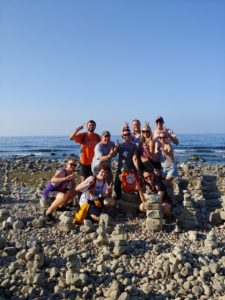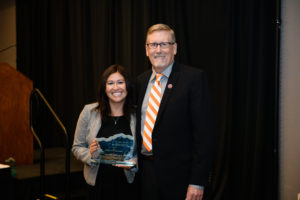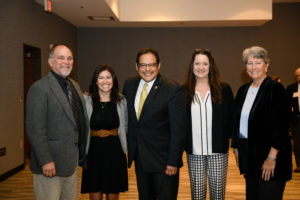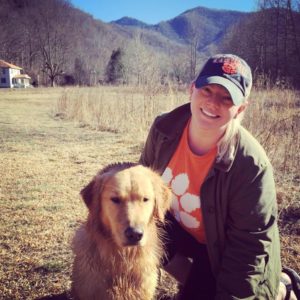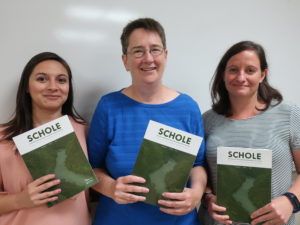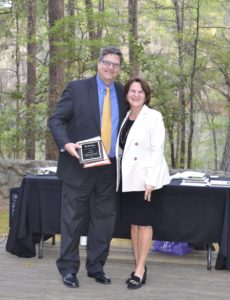
This week, we celebrated the hard work and achievements of an outstanding group of parks, recreation and tourism management students!
Awards were given to undergraduate students, graduate students and alumni. Each award winner was chosen based on his or her academic achievement, leadership and professional involvement and strength of character.
This week, we celebrated the hard work and achievements of an outstanding group of parks, recreation and tourism management students!
Awards were given to undergraduate students, graduate students and alumni. Each award winner was chosen based on his or her academic achievement, leadership and professional involvement and strength of character.
2021 – 2022 winners are as follows:
Certificate of Academic Excellence: This recognition is given to students with outstanding GPAs.
Maggie Brewer, Ann-Preston Campbell, Jillian Courtney, Berkley Derrick,Sarah Feller, McKenzie Maffett, Meredith Powell, Elli Seabrook, AubreyWease, Jordyn Weber
Academic Achievement Award at the Junior Level & Senior Level: This award is presented to the junior & senior with the highest GPA.
Juniors: Creighton Boyd, Mary Scott Brown, Madison Ederer, Grace Groke,Danielle Hess, Micah King, Leila Long, Elise Macaron, Nicholas Massey,Megan Medley, Thomas Romano, Jackson Satterfield Seniors: Claire Beaudry, Shelby Bentley, Grant Blasingame, SofieChirichiello, Ryan Schuchmann
Award of Excellence in Community Recreation, Sport and Camp Management: This award is presented to an outstanding senior in Community Recreation, Sport and Camp Managementon the basis of academic achievement, leadership and professional involvement in a CRSCM related field.
Marie Benedetti and Davis King
Park and Conservation Area Management Founders and Leaders’ Award: This award is presented to a junior or senior in Park and Conservation Area Management who exemplifies the values, work, leadership and spirit of the founders and leaders of our public lands.
Maggie Brewer
Award for Excellence in Recreational Therapy: This award is presented to a student who displays high academic standards while achieving excellence in Recreational Therapy through service to special populations and achievement in professional activities.
Marley Neal
Award for Excellence in Professional Golf Management: This award is presented to an outstanding senior in PGA Golf Management on the basis of academic acheivement, leadership and professional involvement in golf management.
Nolan Miller
Award for Excellence in Travel and Tourism: This award recognizes an outstanding student in Travel and Tourism based on academic achievement and demonstrated interest and dedication to the Travel and Tourism field.
Cayman Williams
Markvan Bellamy Brooks Endowed Scholarship Award: This award is presented to an outstanding undergraduate student studying sport management. The scholarship recognizes the life and work of Robert H. Brooks, ’60 and Mark Bellamy Brooks, ’91.
Nicole Entrup
Lawrence R. Allen Engaged Future Professional Award: This award is given to an undergraduate PRTM student who has demonstrated a commitment to professional engagement in the PRTM field.
Izzy Miller
Greg Schoper Leadership Award: Established to honor a graduate of the department who was killed in action in Vietnam, this award recognizes the department’s most outstanding student leader of the year.
McKenzie Maffett
Stevenson-Smith-Lovett Award: Established in memory of the families of the donors, this award is presented to a rising senior who exemplifies personal qualities of integrity, love, compassion, service and a positive attitude.
Emily Brady
Judith E. Voelkl Scholarship Award: This award recognizes a student who plans to serve the public through a career in the PRTM field, has academic achievement of at least a 3.0 GPA, and who exhibits the qualities of caring, compassion, commitment and spirit.
Scarlett Lawthorne
Bert and Johnnie Brantley Outstanding Student Award: This award is presented to two PRTM seniors who have exhibited outstanding service to the PRTM Department, the University and the community during the student’s academic career at ClemsonUniversity while maintaining a 3.0 GPA.
Shelby Bentley and Sarah Bratton
Marsha A. Ward ’79 Fellowship for Play: The Marsha A. Ward ’79 Fellowship for Play is awarded annually to a Clemson University graduate student inPRTM who demonstrates a commitment to play and the value of play in modern society.
Leslie Heffington
Graduate Student Awards of Excellence: This award recognizes graduate students who are distinguished through academic achievement,scholarship, community service and perseverance.
Anup K C, Olivia McAnirlin and Kaitlin Mueller
Francis A. McGuire Graduate Student Teaching Award: This award is presented to a graduate student who has shown excellence in teaching exemplified by the qualities of caring, passion and engagement with students.
Ali Dubin and Felipe Tobar
Brett A. Wright Award for Graduate Student Achievement: This award recognizes graduate students who are distinguished through outstanding academic achievement.
Rita Penniman and Tania Santiago-Perez
Outstanding Alumnus Award: This award is presented to former PRTM graduate student who have made outstanding contributions in the field of parks and recreation.
Practitioner: Jennifer Bozard Academic: Dr. Melissa Weddell
PRTM Student Ambassador Recognition: This recognition is given to students who have represented PRTM as Student Ambassadors andhave helped to advance the mission of the department by sharing their experiences with currentand prospective students.
Grace Caroline Bell, Taylor Bogucki, Sage Ennis, Alia Logoleo, Jordyn Weber
Recognition of Retirement: This award is presented to faculty and staff members in recognition of their years of service to the PRTM department and as a celebration of their retirement.
Larry Allen, Ken Backman, Karin Emmons, Fran McGuire, TequillaStokes, David Taylor, Bill Quinn
Recognition of Service: This award is presented to the person who provided impactful service and positive contributions to the Department of Parks, Recreation and Tourism Management.
Paul Borick
Distinguished Service Award: This award is presented in recognition of impactful service, positive contributions and steadfast leadership to the Department of Parks, Recreation and Tourism Management.
Dr. Jeff Hallo
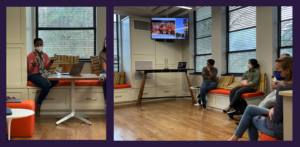
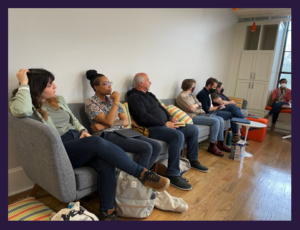

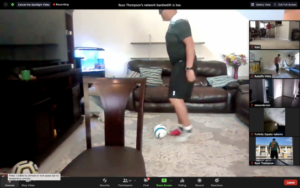
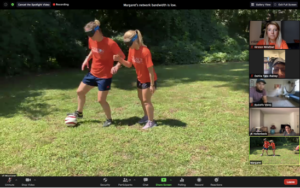


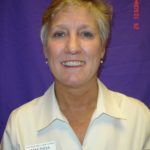

 Cait Henry is a master’s student in the Department of Parks, Recreation, and Tourism Management with a B.A. in Environmental Studies and originates from Saint Louis, Missouri. She works as a Project Coordinator and Master’s Research Assistant in the Parks Solutions Lab, where she has had the opportunity to network with other highly motivated and passionate social scientists. She was accepted into the Ph.D. program at Kansas State University under Dr. Jessica Fefer in the department of Horticulture and Natural Resources, and will move back to the Midwest after graduating this May. Her hobbies include: hiking and backpacking along the Blue Ridge Parkway, reading at coffee shops, discovering new craft breweries and slowly turning her cats into Adventure Cats.
Cait Henry is a master’s student in the Department of Parks, Recreation, and Tourism Management with a B.A. in Environmental Studies and originates from Saint Louis, Missouri. She works as a Project Coordinator and Master’s Research Assistant in the Parks Solutions Lab, where she has had the opportunity to network with other highly motivated and passionate social scientists. She was accepted into the Ph.D. program at Kansas State University under Dr. Jessica Fefer in the department of Horticulture and Natural Resources, and will move back to the Midwest after graduating this May. Her hobbies include: hiking and backpacking along the Blue Ridge Parkway, reading at coffee shops, discovering new craft breweries and slowly turning her cats into Adventure Cats.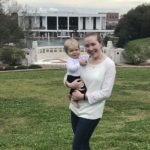 Kaitlin Mueller is a proud Clevelander with a passion to live in a world where one day all people have access to recreation therapy services. She completed her undergrad in RT at Slippery Rock University and finished her master’s studies at Indiana University in RT. After graduating from Slippery Rock University, Kaitlin worked as a recreational therapist in geriatric, sub-acute rehabilitation in Cleveland for five years. Kaitlin is now a 2nd year Ph.D. student in RT with hopes of becoming a future academic. Kaitlin’s research interest is currently transitional care for older adults when moving into a new senior facility. Kaitlin enjoys all the quality time she can get with her husband and almost one-year-old son, preferably at Clemson baseball or softball games. Go Tigers!
Kaitlin Mueller is a proud Clevelander with a passion to live in a world where one day all people have access to recreation therapy services. She completed her undergrad in RT at Slippery Rock University and finished her master’s studies at Indiana University in RT. After graduating from Slippery Rock University, Kaitlin worked as a recreational therapist in geriatric, sub-acute rehabilitation in Cleveland for five years. Kaitlin is now a 2nd year Ph.D. student in RT with hopes of becoming a future academic. Kaitlin’s research interest is currently transitional care for older adults when moving into a new senior facility. Kaitlin enjoys all the quality time she can get with her husband and almost one-year-old son, preferably at Clemson baseball or softball games. Go Tigers!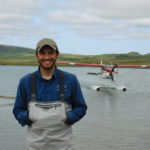 John is currently in the final semester of his master’s degree in Parks, Recreation, and Tourism Management at Clemson University where he works as a research assistant for Dr. Matt Brownlee in the Park Solutions Lab. Through his assistantship, he has helped to write four extensive visitor management reports for national parks across the country, conducted visitor surveys in three additional parks, and drafted five research articles for submission to peer reviewed journals this spring. His thesis focuses on integrating emotional affect into bear management and bear safety education. Prior to coming to Clemson, John received his bachelor’s degree in Wildlife Biology and Statistics from the University of Montana. Between programs, John worked as a veterinary technician in Texas, interpreter at a grizzly bear sanctuary in Montana, and a panda behavior intern in China. John and his fiancée, Emma, will get married in May and he hopes to continue on towards a doctoral degree in wildlife biology and work in grizzly bear research and management.
John is currently in the final semester of his master’s degree in Parks, Recreation, and Tourism Management at Clemson University where he works as a research assistant for Dr. Matt Brownlee in the Park Solutions Lab. Through his assistantship, he has helped to write four extensive visitor management reports for national parks across the country, conducted visitor surveys in three additional parks, and drafted five research articles for submission to peer reviewed journals this spring. His thesis focuses on integrating emotional affect into bear management and bear safety education. Prior to coming to Clemson, John received his bachelor’s degree in Wildlife Biology and Statistics from the University of Montana. Between programs, John worked as a veterinary technician in Texas, interpreter at a grizzly bear sanctuary in Montana, and a panda behavior intern in China. John and his fiancée, Emma, will get married in May and he hopes to continue on towards a doctoral degree in wildlife biology and work in grizzly bear research and management. Suk is a fourth-year graduate (Ph.D.) student in Parks, Recreation and Tourism Management with a research focus on the development of disability sport through corporate social responsibility. He has put forth significant effort to find ways for firms, as well as sport organizations, to make a social impact and address community priorities, especially for the communities of persons with a disability.
Suk is a fourth-year graduate (Ph.D.) student in Parks, Recreation and Tourism Management with a research focus on the development of disability sport through corporate social responsibility. He has put forth significant effort to find ways for firms, as well as sport organizations, to make a social impact and address community priorities, especially for the communities of persons with a disability.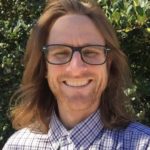 Brian completed his bachelor’s degree at the University of San Diego, and he completed his master’s degree at the University of Utah. His doctoral research focuses on advancing spatiotemporal research of visitor travel patterns within parks and protected areas. His dissertation is comprised of research conducted at Theodore Roosevelt National Park in North Dakota, Hawai’i Volcanoes National Park and the Bonneville Salt Flats in Utah.
Brian completed his bachelor’s degree at the University of San Diego, and he completed his master’s degree at the University of Utah. His doctoral research focuses on advancing spatiotemporal research of visitor travel patterns within parks and protected areas. His dissertation is comprised of research conducted at Theodore Roosevelt National Park in North Dakota, Hawai’i Volcanoes National Park and the Bonneville Salt Flats in Utah.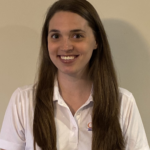 Ali Dubin is a graduate student from East Greenbush, New York. She is working towards her Ph.D. in Community Recreation, Sport and Camp Management. After high school, Ali spent eight summers working at Girl Scout Camps in NY and VA, sparking her interest in camp and camp administration. Her research focuses on issues in camp administration, with a specific focus on children with severe food allergy and the constraints to participation that they face. She has had the opportunity to use her formal education and camp skills to teach many classes at Clemson University including Finding Your Voice, Camp Administration and the Writing Mentor Program. When Ali is not talking or thinking about camp, which is rare, she likes hiking with her dog Ari and spending time by the lake. Her other hobbies include wine tasting, reading cheesy romance novels and crafting: she hopes to have more time to do these things after finishing her dissertation.
Ali Dubin is a graduate student from East Greenbush, New York. She is working towards her Ph.D. in Community Recreation, Sport and Camp Management. After high school, Ali spent eight summers working at Girl Scout Camps in NY and VA, sparking her interest in camp and camp administration. Her research focuses on issues in camp administration, with a specific focus on children with severe food allergy and the constraints to participation that they face. She has had the opportunity to use her formal education and camp skills to teach many classes at Clemson University including Finding Your Voice, Camp Administration and the Writing Mentor Program. When Ali is not talking or thinking about camp, which is rare, she likes hiking with her dog Ari and spending time by the lake. Her other hobbies include wine tasting, reading cheesy romance novels and crafting: she hopes to have more time to do these things after finishing her dissertation. Donna earned her Bachelor’s degree in Recreational Therapy at the University of Maryland. She earned an MBA from the Pennsylvania State University and is currently working toward her Ph.D. at Clemson University. She is the Chief of Recreational Therapy at the National Institutes of Health Clinical Center. She has managed interdisciplinary treatment teams and has clinical experience working with a variety of patient populations including individuals who have sustained traumatic brain injuries. Her interests include program development, process improvement, and research related to the health and well-being of at-risk populations.
Donna earned her Bachelor’s degree in Recreational Therapy at the University of Maryland. She earned an MBA from the Pennsylvania State University and is currently working toward her Ph.D. at Clemson University. She is the Chief of Recreational Therapy at the National Institutes of Health Clinical Center. She has managed interdisciplinary treatment teams and has clinical experience working with a variety of patient populations including individuals who have sustained traumatic brain injuries. Her interests include program development, process improvement, and research related to the health and well-being of at-risk populations.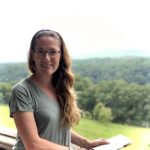 Jennifer Kinch Garcia is finalizing her 2nd year as a doctoral student with the Clemson University Parks, Recreation and Tourism Management program. Her focus lies mostly within Community Recreation, Sport and Camp Management with an emphasis in youth development. Jennifer is working towards the evaluation of nature based free play, and how communities can support the spaces and policies that surround the concept of free play. After graduating with a B.S. in Biology from West Texas A&M University, she began her career within the world of zoos and aquariums at the Amarillo Zoo in Amarillo, Texas. She started her role at the Greenville Zoo as the Education Coordinator in 2012. Since moving to Greenville, South Carolina she has earned her M.Ed. for Curriculum Development and through her work, has been fortunate to be a part of the Association of Zoos and Aquariums Nature Play initiatives along with the Children and Nature Network’s family nature clubs, to encourage communities to get outdoors. Jennifer looks forward to promoting play through more equitable access to parks and community engagement.
Jennifer Kinch Garcia is finalizing her 2nd year as a doctoral student with the Clemson University Parks, Recreation and Tourism Management program. Her focus lies mostly within Community Recreation, Sport and Camp Management with an emphasis in youth development. Jennifer is working towards the evaluation of nature based free play, and how communities can support the spaces and policies that surround the concept of free play. After graduating with a B.S. in Biology from West Texas A&M University, she began her career within the world of zoos and aquariums at the Amarillo Zoo in Amarillo, Texas. She started her role at the Greenville Zoo as the Education Coordinator in 2012. Since moving to Greenville, South Carolina she has earned her M.Ed. for Curriculum Development and through her work, has been fortunate to be a part of the Association of Zoos and Aquariums Nature Play initiatives along with the Children and Nature Network’s family nature clubs, to encourage communities to get outdoors. Jennifer looks forward to promoting play through more equitable access to parks and community engagement.
